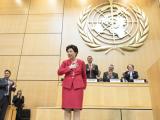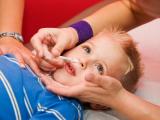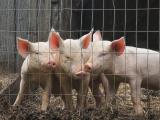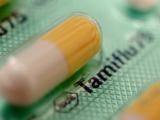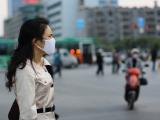Apr 20, 2010
Sebelius cites H1N1 success stories
Health and Human Services (HHS) Secretary Kathleen Sebelius yesterday thanked those "on the front lines" fighting H1N1 flu and highlighted successes. Among them: investing in preparedness, declaring a public health emergency quickly, mobilizing health workers for vaccination, relaying prevention messages, reaching out to other nations, ensuring vaccine safety, defining vaccine priority groups, and employing creative distribution. She said HHS needs to better engage minorities and physicians.
http://www.hhs.gov/secretary/speeches/sp20100419.html
Sebelius's Apr 19 speech
Volcanic ash smothers New Zealand's vaccinations
New Zealand's Ministry of Health has halted clinic and workplace influenza vaccinations because of supply issues related to the volcanic ash cloud over Europe, according to Radio New Zealand. Although demand for seasonal influenza vaccine, which includes the pandemic strain, has been "unprecedented" for this time of year, the ash cloud has disrupted vaccine shipments from Paris. An immunization manager said the country has 80,000 vaccine doses in stock.
http://www.radionz.co.nz/news/stories/2010/04/20/1247fe67c9cc
Apr 20 Radio New Zealand report
Alberta seeks reimbursement for unused vaccine
Alberta, Canada, is recalling more than 650,000 unused doses of H1N1 vaccine and seeking a refund from its maker, GlaxoSmithKline (GSK), according to the Ontario-based National Post. Health Canada has reduced the expiration date for adjuvanted vaccine only from 18 to 6 months, which has left the province with $2.2 million worth of about-to-expire vaccine. An Alberta official said there will be discussions with federal officials, regulators, and GSK about reimbursement.
http://www.nationalpost.com/news/story.html?id=2910645
Apr 15 National Post story
Most Australians willing to take vaccine during pandemic
An Australian survey found that most participants would accept pandemic H1N1 vaccine, though their perceived risk for the disease was low. Vaccine became available there Sep 30, 2009; 627 people were surveyed from Sep 5 to Oct 3: 53% perceived their risk of H1N1 as very low to low; 55% were willing to accept vaccine. Other findings: 25% thought H1N1 would affect their health very seriously or extremely, and 49% had made one or more behavior changes (eg, avoiding crowds, frequent hand washing).
http://www.biomedcentral.com/1471-2334/10/99/abstract
Apr 19 BMC Infect Dis abstract
French show low acceptance of H1N1 vaccine
A survey of over 2,000 people conducted in France 1 week before the country's November H1N1 peak found the H1N1 vaccine as acceptable by only 17% of respondents. Acceptance was highest among pregnant women, people with chronic diseases, and those who had been formally advised to get vaccine. Of those refusing vaccination, 71% noted safety concerns. H1N1 was perceived as a severe disease by 36%. A mass vaccination campaign had begun last July in France but did not involve primary care physicians.
http://www.plosone.org/article/info%3Adoi%2F10.1371%2Fjournal.pone.0010199
Apr 16 PLoS ONE study


